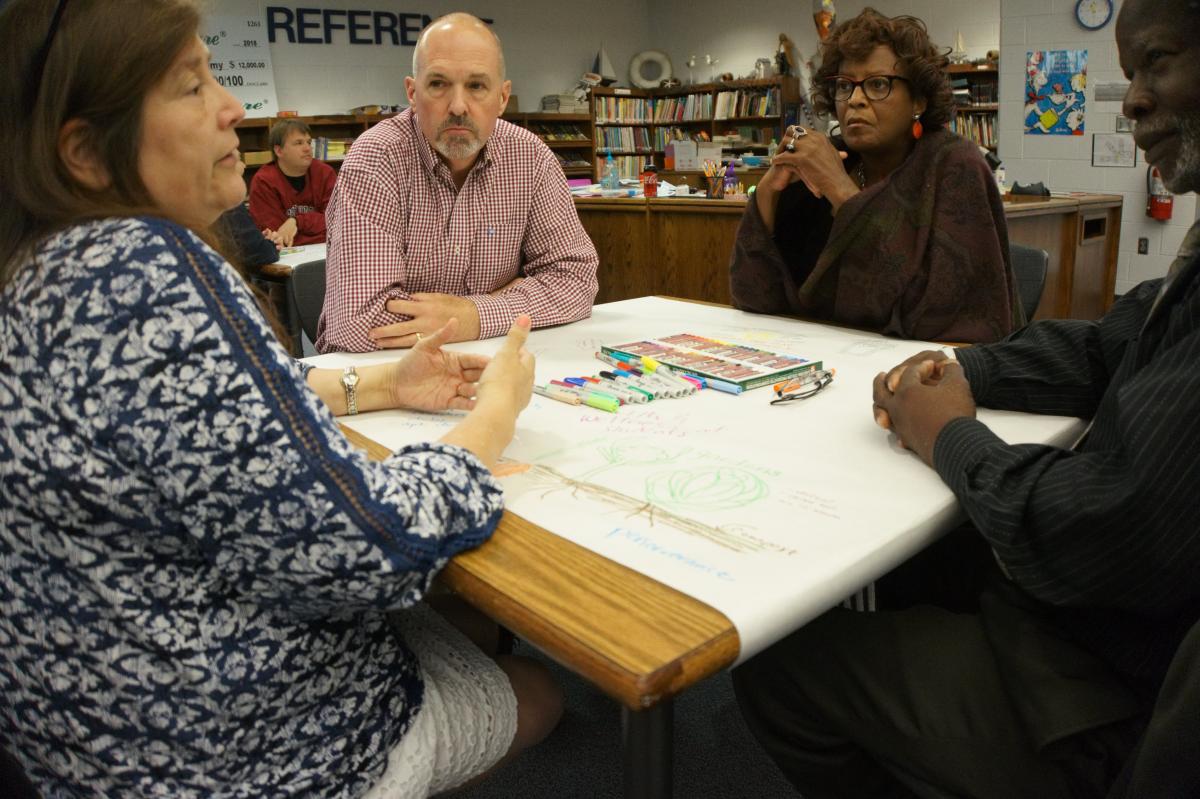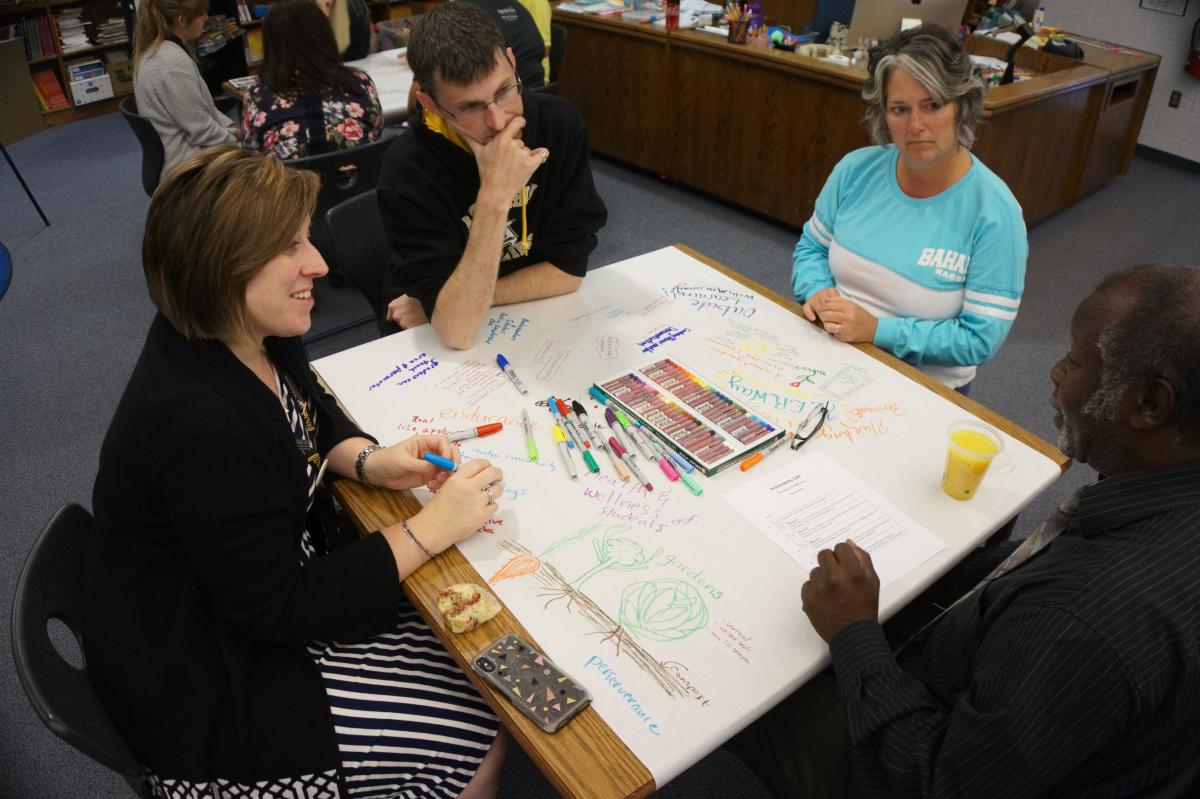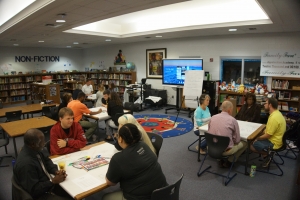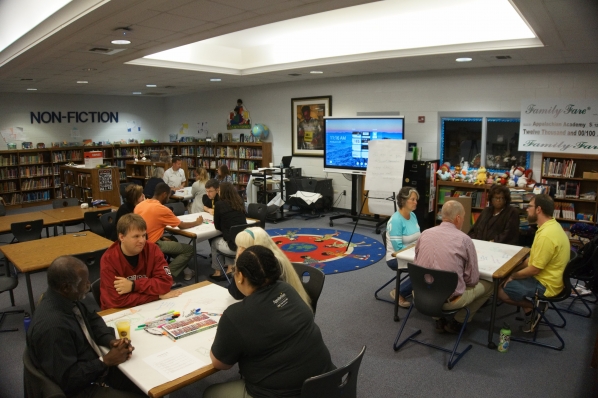uring June 2019, the Appalachian State University Academy at Middle Fork partnered with the Reich College of Education’s (RCOE) Sustainability Committee, Appalachian’s Office of Sustainability, and Blue Ridge Women in Agriculture (BRWIA) to train Academy teachers, staff, and administrators on environmental stewardship and sustainability. Attendees further developed leadership skills, discussed sustainability topics, and learned about various green initiatives. Mel Falck ’14 and Dr. Vachel Miller, both of Appalachian’s RCOE, facilitated the leadership development.
Funding the Future
This professional development opportunity was made possible by funding from the JustPax Fund (JPF), a grant-making organization dedicated to supporting the work of gender, environmental, and economic justice.
Falck, an undergraduate teacher education adviser in Appalachian’s James Center for Student Success and Advising, which is housed in the RCOE, received $4,830 in funding to extend Appalachian’s mission of “creating a sustainable future for all” down the mountain to the Academy. He is also a student in Appalachian’s doctoral program in educational leadership and chair of the college’s Sustainability Committee.
Miller is a professor in the RCOE’s Department of Leadership and Educational Studies (LES) and the newly appointed director of the doctoral program in educational leadership.
 Miller, left, and 5th grade teacher Monique Johnson, right, listen as a training attendee shares their thoughts. Photo by Mel Falck
Miller, left, and 5th grade teacher Monique Johnson, right, listen as a training attendee shares their thoughts. Photo by Mel Falck
Additional facilitators included Academy Principal Tasha Hall-Powell '01 '09, Dr. Lee Ball, Appalachian’s Chief Sustainability Officer, and BRWIA representatives, Debbie Bauer and Rachel Conway. Together, they led a group of Academy teachers and Appalachian faculty members in an exploration of methods to incorporate sustainability into the curriculum and culture of the Academy through initiatives that include:
school gardens;
zero waste planning;
connecting with local farms;
introducing healthy, organic food into school lunches;
and, sustainability-focused field trips.
 From left to right: Media Specialist Carla Clayton, Dr. Eric Groce, professor in the RCOE’s Department of Curriculum & Instruction, 4th grade teacher Wanda McLemore, and Master Gardener Johnell Hunter, Sr. discuss the incorporation of sustainable initiatives into the Academy. Photo by Vachel Miller
From left to right: Media Specialist Carla Clayton, Dr. Eric Groce, professor in the RCOE’s Department of Curriculum & Instruction, 4th grade teacher Wanda McLemore, and Master Gardener Johnell Hunter, Sr. discuss the incorporation of sustainable initiatives into the Academy. Photo by Vachel Miller
Sustainability mini-grants, which can award up to $1,000 to assist with the implementation of these projects, are also included in the JustPax funding. All attendees of the professional development training are eligible to apply. Applications are currently being accepted and will be reviewed by Falck, Miller, Hall-Powell, and RCOE Assistant Dean for the Academy at Middle Fork, Dr. Robin Groce.
Planting the Seeds of Sustainability
One of the Academy’s key commitments is “amplifying sustainability,” and the professional development provided to its faculty and staff was a step towards honoring that commitment. The training aimed to promote leadership development in sustainability for the school’s educators and administrators by combining the RCOE’s own commitment to sustainability - part of the college’s mission is fostering sustainable practices - and their dedication to progressive pedagogy.
 From left to right: Snow, 2nd grade teacher Brent Macrow, 1st grade teacher Marla Cantrell, and Hunter discuss community resources that would assist in the construction of a school garden at the Academy. Photo by Vachel Miller
From left to right: Snow, 2nd grade teacher Brent Macrow, 1st grade teacher Marla Cantrell, and Hunter discuss community resources that would assist in the construction of a school garden at the Academy. Photo by Vachel Miller
Dr. Amie Snow ‘06 ‘14, director of curriculum and instruction at the Academy, can already picture the impact the training will have on the school.
“The professional development training allowed Academy teachers and staff to interact with community members and members of the sustainability department to discuss the immediate needs as well as the future goals of sustainability for the Academy,” she said. “Our staff has already been working to develop a grant around supporting a zero waste initiative and a school garden for the Academy. We are excited about the possibilities this will provide for our students to engage with our school community and take ownership of their own learning around sustainability.”
“Our staff has already been working to develop a grant around supporting a zero waste initiative and a school garden for the Academy. We are excited about the possibilities this will provide for our students to engage with our school community and take ownership of their own learning around sustainability.” -- Dr. Amie Snow
But the impact doesn’t stop there. The training at the Academy is representative of the environmental stewardship that will hopefully become present in every school, everywhere.
“Considering the ongoing and persistent environmental challenges we face, the incorporation of sustainable principles into our educational climate is arguably one of the most pressing concerns of our time,” remarked Falck. “This opportunity serves as but one small endeavor to help move our educational culture towards an increased commitment to environmental awareness and sustainable practice.”
“Considering the ongoing and persistent environmental challenges we face, the incorporation of sustainable principles into our educational climate is arguably one of the most pressing concerns of our time." -- Mel Falck
As the Academy prepares to enter its second academic year as an Appalachian lab school, professional development like this further equips it for continued success and echoes the core values of its “college on the mountain."
Related Stories
About the Reich College of Education
Appalachian offers one of the largest undergraduate teacher preparation programs in North Carolina, graduating about 500 teachers a year. The Reich College of Education enrolls approximately 2,400 students in its bachelor's, master's, education specialist and doctoral degree programs. With so many teacher education graduates working in the state, there is at least one RCOE graduate teaching in every county in North Carolina. Learn more at https://rcoe.appstate.edu.
About Sustainability at Appalachian
Appalachian State University’s leadership in sustainability is known nationally. The university’s holistic, three-branched approach considers sustainability economically, environmentally and equitably in relationship to the planet’s co-inhabitants. The university is an active steward of the state’s interconnected financial, cultural and natural resources and challenges students and others think critically and creatively about sustainability and what it means from the smallest individual action to the most broad-based applications. The university offers both undergraduate and graduate academic degree programs that focus on sustainability. In addition, 100 percent of Appalachian’s academic departments offer at least one sustainability course or course that includes sustainability, and all students graduate from programs that have adopted at least one sustainability learning outcome. Learn more at https://appstate.edu/sustainability.

